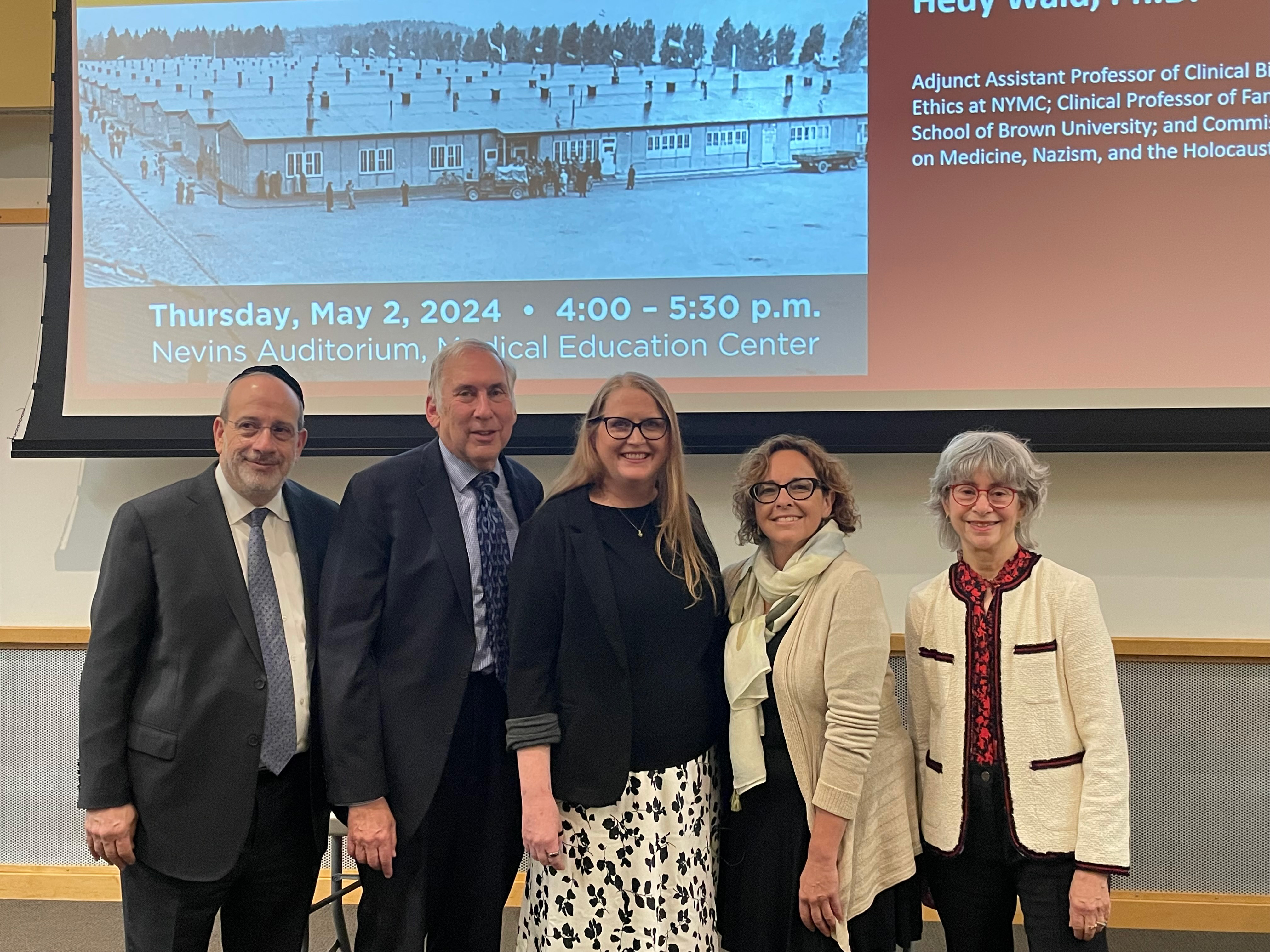
NYMC Reflects on the Legacy of Medicine During the Holocaust for Yom Hashoah
Hedy Wald, Ph.D., Delivers Keynote on Integrating Holocaust Awareness in Medical Education

The New York Medical College (NYMC) and Touro University (TU) communities gathered for a solemn and insightful observation of Yom Hashoah on May 3. Hedy Wald, Ph.D., second from right, adjunct assistant professor of clinical biomedical humanities and ethics, NYMC, and clinical professor of family medicine, Alpert Medical School of Brown University; and Commissioner, Lancet Commission on Medicine, Nazism, and the Holocaust, presented her keynote lecture on the legacy of medicine during the Holocaust and its contemporary relevance, shedding light on the lessons to be learned.
Marie T. Ascher, M.S., M.P.H., middle, the Lillian Hetrick Huber Endowed director of the Phillip Capozzi, M.D., Library and moderator of the event, led the opening remarks. Anne Bayefsky, M.A., LLB, right, director of Touro Institute on Human Rights and the Holocaust, honored the occasion by lighting the memorial candle and reciting "The Blessing of the Yellow Candle” and "Who Am I To Speak of a Time?"
As the room absorbed the echoes of Bayefsky’s words, Edward C. Halperin, M.D., M.A., second from left, chancellor and chief executive officer, delivered remarks honoring Esther Lederman, a Holocaust survivor. Lederman and her family sought refuge in the village of Chmielnik during the Nazi occupation. Her mother and sister were captured and killed in Treblinka. Lederman was hidden for nearly two years by the Zal family, who are recognized as righteous Christians in both the U.S. Holocaust Museum and in Yad Vashem. She was liberated by the Red Army but fled post-war pogroms to the American occupation zone in Germany. Lederman lectured about her experiences at colleges, schools, military bases, and civic organizations.
Halperin's voice resonated with conviction as he recounted Lederman's story, underscoring the profound importance of bearing witness to the past. “Silence in the face of evil, only advantages the victims,” he said. “It never advantages the oppressors. NYMC convenes today’s program, in part, to convey the message that health care professionals need to be cognizant of the dangers of language and capable of responding.”
Building upon this imperative, Dr. Wald, daughter of a Holocaust survivor, took to the podium to share her research on integrating Holocaust awareness into medicine, emphasizing its benefits for medical education and practice. She delved into the historical context of eugenics during the Holocaust, highlighting the involvement of physicians in ethnic and racial cleansing, targeting Jews and people with disabilities.
Dr. Wald emphasized the purpose of teaching medical students the atrocities committed during the Holocaust, particularly focusing on the involvement of medical professionals and institutions in unethical human experimentation, sterilization programs, and euthanasia to produce the future culturally aware physicians. Every year, she takes twenty medical students to the Auschwitz-Birkenau concentration camp to teach them about medicine and the Holocaust. The students consider the unethical tragedies and their role in shaping the health care system as empathetic professionals.
During the question-and-answer session hosted by Ascher, numerous insights were shared on how medical organizations acknowledging their involvement in unethical behaviors during the Holocaust can take steps to rectify their actions, and on how medical students can become socially conscious physicians.
Rabbi Moshe D. Krupka, M.S., left, executive vice president, TU, concluded the event by recounting the experiences of Zalman Gradowski, a Jewish-Polish prisoner in Auschwitz-Birkenau concentration camp. Gradowski courageously documented his life and the atrocities he witnessed in a secret diary, shedding light on the extermination process. He tragically perished during the revolt of October 7, 1944. Rabbi Krupka closed the event with a prayer alongside Rabbi Baruch Fogel, M.A., of TU.
“The purpose of these programs is not to merely weep, but to instill through education, emotional git, and commitment to a better day,” said Rabbi Krupka. “That Tikvah, that hope, for all people, for peace, for tranquility, for understanding and value of life and true ethics.”

